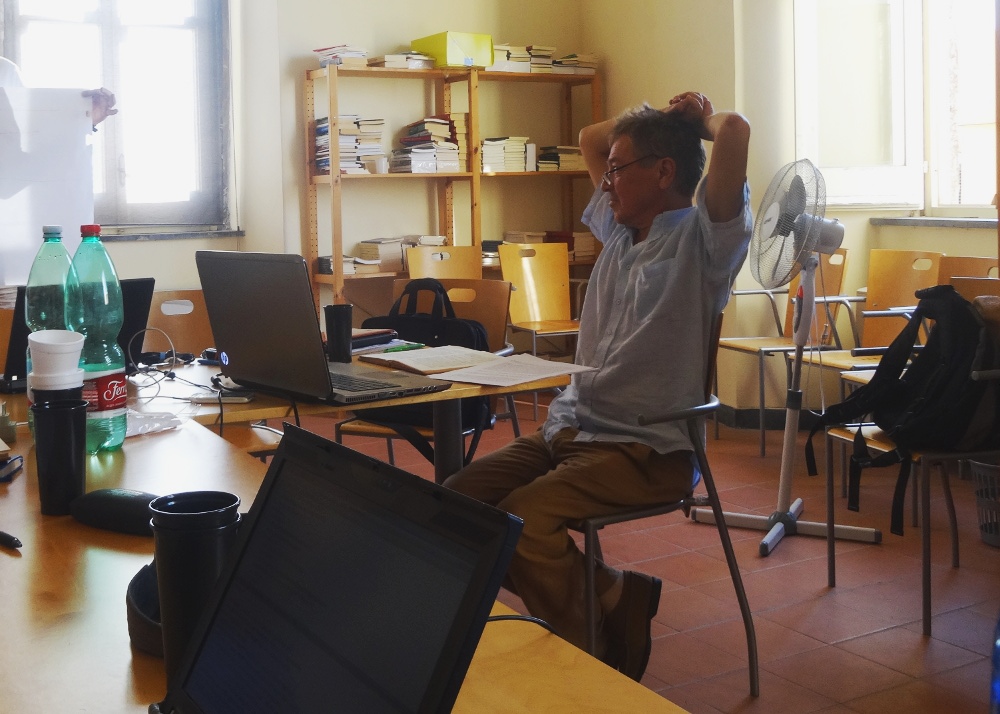I met Helmut Krasser during my Erasmus year in Vienna, back in the Nineties. We sat together (meaning that he, Horst Lasic and Ernst Steinkellner prepared and led the meetings whereas I and other people tried to follow and to add minor points from time to time) at the Academy, reading Jinendrabuddhi’s commentary on Dignāga’s Pramāṇasamuccaya. I also attended his classes about Classical Tibetan, where we would read Michael Hahn’s manual and Helmut would add his comments, e.g., “Forget about it, you’ll never find this form!”. I then had to leave Vienna abruptly, but throughout the years, whenever I would visit him, he was nice and fun. Although he has published widely and his contributions make of him one of the leading scholars of the Buddhist epistemological school, he would not respect hierarchies for their own sake and would rather drink a beer with whomever he found interesting.
After his Habilitation (if you have no idea about this, read here) the university of Vienna assumed he would have taught for less money, in order to keep his title of “Un. Doz.” (since in order to keep it one needs to teach). But Helmut could not care less for titles and the university decided to keep on paying him as before.
That he was a rebel had not only an impact on his personal life, but it acquired also more and more importance also for his intellectual approach. Though a scholar of Dharmakīrti and of “his” school, Helmut would not even dream of being also his “fan”. He could discuss critically about Dharmakīrti’s debt to Kumārila (Dharmakīrti’s and Kumārila’s Refutations of the Existence of God: A Consideration of Their Chronological Order) and even of the religious foundation of his positions —although a non-religious person like Helmut might have preferred to stick at the position that the Buddhist epistemological school was purely devouted to logic and epistemology (Are Buddhist Pramāṇavādins non-Buddhistic? Dignāga and Dharmakīrti on the impact of logic and epistemology on emancipation). He was not intimidated by one of the few fixed dates of Indian philosophy, and dared questioning the real life time of Dharmakīrti and Bhāsarvajña (and, by consequence, of almost any other author of Indian philosophy!), although it had been established by his paramaguru Erich Frauwallner (Bhāviveka, Dharmakīrti and Kumārila). He also questioned Ernst Steinkellner’s system to refer to quotations and references on the basis of his deep knowledge of manuscriptology (you can read a short discussion of the issue here).
Some years ago, he started a real “rebel enterprise”, since he questioned the status of some milestones of Indian philosophy, suggesting that they were not the work of their alleged authors, but rather the result of note-taking by their students. That this can be the case is proven by the parallel with Aristotle or with Kant’s Logik, but even conceiving such a hypothesis entails the ability of thinking against the tide. Helmut could look beyond the authoritative status of, e.g., the Tarkajvālā and saw the silly objections and the all-too-easy explanations of the elements of the syllogisms (“this is the probans, this is the example…”) and was brave enough to think of an alternative explanation, namely, that they were the result of questions of less brilliant students.
I must now add that Helmut passed away in the night between March the 29t and the 30th, after a long fight against cancer, which he fought courageously and in his own way: He would not refrain from calling his illness with its name (even when we tried to avoid it) and discussed about his attempt to kill cancer’s cells with wine and cigarettes(!).
An obituary can be read on Indology.
For a post on the last book edited by Helmut Krasser, see here. The photo of Helmut last September in Procida for a workshop is by Birgit Kellner.
(I am grateful to Isabelle Ratié, who allowed me to avoid a misunderstanding in the text above).


Thank you very much for this obituary on this extremely sad occasion. I wrote a Russian necrologue: http://edgar-leitan.livejournal.com/240415.html
Some of my own photos with Helmut: https://www.facebook.com/media/set/?set=a.750395035001164.1073741848.100000920241532&type=1&l=2c9f4ffc51
Thank you, Edgar. I had seen the photos in your Russian obituary and sent the link to RT, who was very pleased since he did not have any photo of himself with Helmut.
Elisa, thank you for this writ. Jan
thanks, Jan.